英语人教版九年级全册Unit 6被动语态
人教版九年级英语unit6 被动语态专项训练
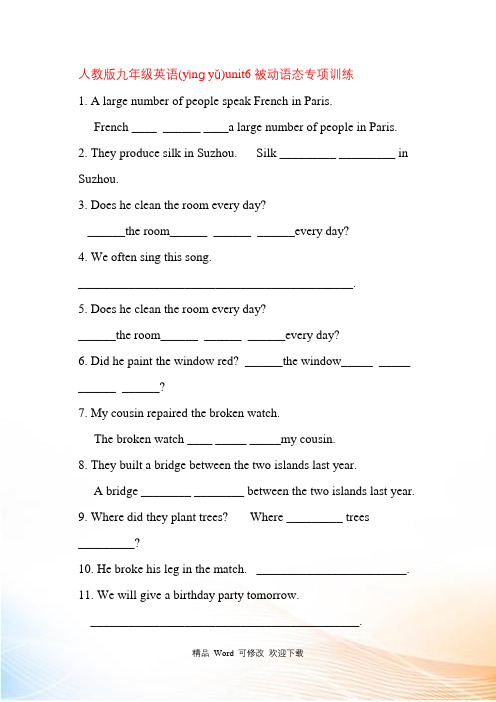
人教版九年级英语(yīnɡ yǔ)unit6 被动语态专项训练1. A large number of people speak French in Paris.French ____ ______ ____a large number of people in Paris. 2. They produce silk in Suzhou. Silk _________ _________ in Suzhou.3. Does he clean the room every day?______the room______ ______ ______every day?4. We often sing this song.____________________________________________.5. Does he clean the room every day?______the room______ ______ ______every day?6. Did he paint the window red? ______the window_____ _____ ______ ______?7. My cousin repaired the broken watch.The broken watch ____ _____ _____my cousin.8. They built a bridge between the two islands last year.A bridge ________ ________ between the two islands last year.9. Where did they plant trees? Where _________ trees_________?10. He broke his leg in the match. ________________________.11. We will give a birthday party tomorrow.___________________________________________.12. She will sell her house soon.___________________________________________.13. We will build a new library this year.A new library______ _______ _______by_______this year.14. People are still cutting down too many trees in the USA.______________________________________________________.15. He is repairing the machine.___________________________________________.16. Are they teaching foreign languages there?______foreign languages________ ________there?17. Are you going to make a new plane?____a new plane_____ _____ ______ _____?18. He has finished his work.________________________________________.19. Have they finished the new project?______the new project______ _______by______?20. We should plant the trees around the lake.The trees _____ _____ ______around the lake.21. You can borrow two books at a time.Two books _________ _________ _________ at a time.22. We call maths the language of science.Maths _________ _________ the language of science.23.The teacher made the students copy the text.The students _________ _________ _________ copy the text.24. Someone saw John cross the street just now.John _______ _______ _______ ______ the street just now by someone.25. The boss made the workers work all dayThe workers ____ ____ ____ work all day by the boss.26. He gave me a bookI ______ ______ a book by him.A book ____ ____ _____ me by him .27. My mother made me a cake .I ____ _____ a cake by my motherA cake ____ ____ ____ me by my mother .28. I heard Tom singing just nowTom _____ _____ _____ by me just now .29. We should take care of the old . The old should ______ _____ _____ _____ .30. My aunt bought me a present on my birthday.I ____ _____a present by my aunt on my birthday.A present _____ ____ _____me by my aunt on my birthday.内容总结(1)______foreign languages________ ________there。
人教版九年级英语Unit6知识点总结
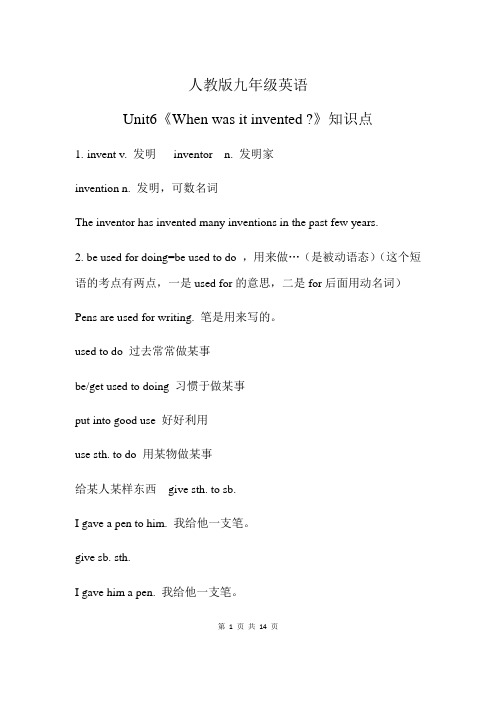
人教版九年级英语Unit6《When was it invented ?》知识点1.invent v. 发明inventor n. 发明家invention n. 发明,可数名词The inventor has invented many inventions in the past few years.2. be used for doing=be used to do ,用来做…(是被动语态)(这个短语的考点有两点,一是used for的意思,二是for后面用动名词)Pens are used for writing. 笔是用来写的。
used to do 过去常常做某事be/get used to doing 习惯于做某事put into good use 好好利用use sth. to do 用某物做某事给某人某样东西give sth. to sb.I gave a pen to him. 我给他一支笔。
give sb. sth.I gave him a pen. 我给他一支笔。
第 1 页共14 页pass/offer /send/show/write/bring/sell/lend/serve/ tobuy/cook/make/get/sing/prepare for4. all day 整天all evening/night the whole day5. salty adj. 咸的salt n. 盐sour/sweet/bitter/hot/salty酸甜苦辣咸6. by mistake 错误地(犯错是:make mistakes=make a mistake,这些常见的短语大家务必要掌握)I took the umbrella by mistake. 我不小心拿错了雨伞。
7. by accident/chance 意外,偶然(常见短语,考的最多的是它的意思)I met her by accident at bus stop.我在公共汽车站意外地见到了她。
人教英语九年级全一册Unit 6When was it invented Section A 3a-

❖doubt /daut/ n. 疑惑;疑问 v. 怀疑
❖without doubt 毫无疑问;的确
boil /bɔil/ v. 煮沸;烧开
❖ Beef should be boiled for at least three hours.
❖牛肉至少要煮三 个小时。
smell /smel/ n. 气味 v. 发出气味;闻到
It mentioned Shen Nong.
The book describes how tea plants were grown and used to make tea.
It also discusses where the finest tea leaves were produced and what kinds of water were used.
❖3. A nice smell was producedwhen the tea leaves dropped into the hot water.
❖4. Tea was brought to Korea and Japan during the 6th and 7th centuries.
❖5. Tea is now traded between many different countries.源自Learning aims:
❖ 1:掌握以下重点词组: ❖ by accident , it is said/believed that ..., fall
into, not...until,one of+复数名词/代词...,in the +序数词+century,take place, without doubt ❖ 2:会运用一般过去时的被动语态结构,讨论茶 叶的发明人、时间、地点等。
Unit 6 语法知识:被动语态 课件-2022-2023学年人教英语九年级全册

五、例题解析
1. A new hospital____D____ in my town next year.
A. builds B. built C. is built D. will be built
解析:主语a new hospital 和谓语动词build为被动关系。 而next year表将来,所以此题考察一般将来时的 被动语态。
20
课堂练习
3.I rode my bike to school yesterday.(改为被动语态) My bike __w_a_s___ _ri_d_d_e_n__ to school by me yesterday.
21
Thanks for listening
22
Beijing National Stadium was built by people. .
9
三、主动句变被动句的步骤
We speak
English.
主动句
主语
2
谓语
3
宾语
1
English bise spoken
(by us).
主语
谓语
宾语
步骤: 1宾变主 2主变宾,前加by
3动变被,看清be, 结构式为be + done
2
一、被动语态的定义
英语中有两种语态:主动语态和被动语态。 在主动语态中,主语是谓语动词的发出者。 在被动语态中,主语是谓语动词的承受者。
被动语态(Passive voice) 被动语态是动词的一种形式,是用于说明主语和谓语之间的关系。 英语语态分为主动语态和被动语态。
People
初中英语人教新目标九年级全一册unit6知识点
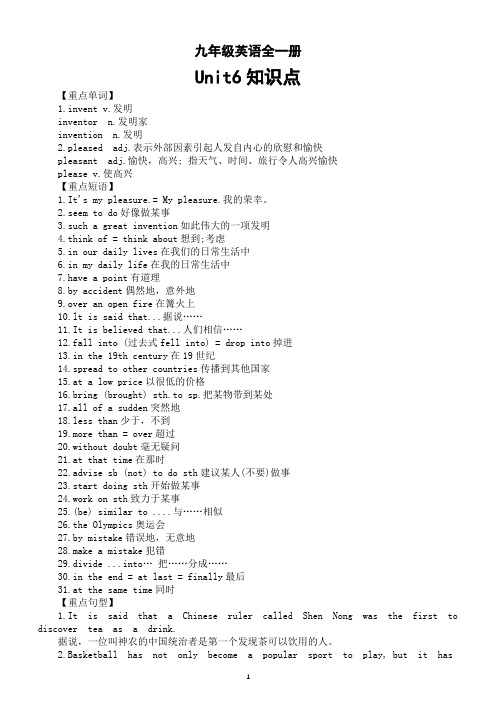
九年级英语全一册Unit6知识点【重点单词】1.invent v.发明inventor n.发明家invention n.发明2.pleased adj.表示外部因素引起人发自内心的欣慰和愉快pleasant adj.愉快,高兴; 指天气、时间、旅行令人高兴愉快please v.使高兴【重点短语】1.It's my pleasure.= My pleasure.我的荣幸。
2.seem to do好像做某事3.such a great invention如此伟大的一项发明4.think of = think about想到;考虑5.in our daily lives在我们的日常生活中6.in my daily life在我的日常生活中7.have a point有道理8.by accident偶然地,意外地9.over an open fire在篝火上10.lt is said that...据说……11.It is believed that...人们相信……12.fall into (过去式fell into) = drop into掉进13.in the 19th century在19世纪14.spread to other countries传播到其他国家15.at a low price以很低的价格16.bring (brought) sth.to sp.把某物带到某处17.all of a sudden突然地18.less than少于,不到19.more than = over超过20.without doubt毫无疑问21.at that time在那时22.advise sb (not) to do sth建议某人(不要)做事23.start doing sth开始做某事24.work on sth致力于某事25.(be) similar to ....与……相似26.the Olympics奥运会27.by mistake错误地,无意地28.make a mistake犯错29.divide ...into…把……分成……30.in the end = at last = finally最后31.at the same time同时【重点句型】1.It is said that a Chinese ruler called Shen Nong was the first to discover tea as a drink.据说,一位叫神农的中国统治者是第一个发现茶可以饮用的人。
九年级Unit 6 When was it invented[被动语态]
![九年级Unit 6 When was it invented[被动语态]](https://img.taocdn.com/s3/m/07a14e5200f69e3143323968011ca300a6c3f69b.png)
• The chair is made of steel. • The chairs are made of steel. • 这里体现了be的数的变化 • The library was built last year. • The library is being built now. • 这里体现了be的时态变化
过去进行时
The pen was being used
was/were being + done by Lily yesterday.
过去完成时 had been + done
They had produced 100 tractors by the end of last year.
4a Rewrite the sentences using the passive voice.
We all want to be teachers.
当某些动词表示状 态或结果时
当宾语表示数量、 重量、大小或程度
The milk tastes slightly sour. the jade weighs one ton.
重点回顾
1. 一般过去时的被动语态 was/were + done
2. 过去将来时的被动语态 would be + done
二、被动语态的构成
• 结构:助动词be+及物动词的过去分词 • 助动词be有人称、数和时态的变化,其变化规则与be作为系动词时
完全一样。 • 请观察以下句子: • I am asked a question by the teacher. • He is asked a question by the teacher. • 这里体现了be的人称变化
人教版英语九年级全一册Unit6【刷语法】一般过去时的被动语态(重点语法提升练)2023年九全一册单
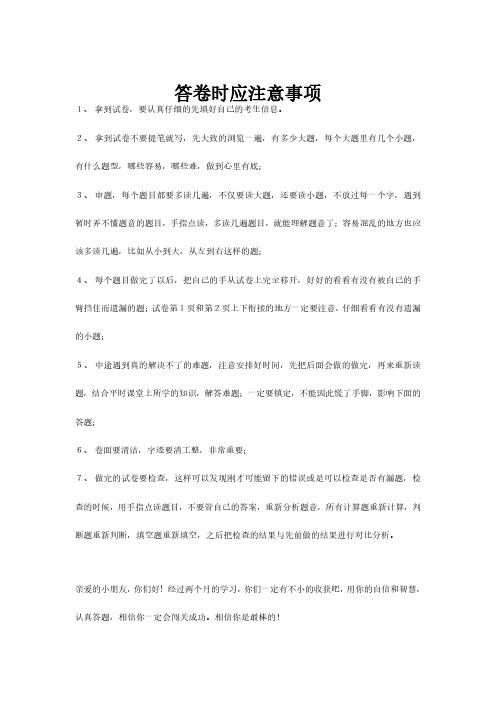
答卷时应注意事项1、拿到试卷,要认真仔细的先填好自己的考生信息。
2、拿到试卷不要提笔就写,先大致的浏览一遍,有多少大题,每个大题里有几个小题,有什么题型,哪些容易,哪些难,做到心里有底;3、审题,每个题目都要多读几遍,不仅要读大题,还要读小题,不放过每一个字,遇到暂时弄不懂题意的题目,手指点读,多读几遍题目,就能理解题意了;容易混乱的地方也应该多读几遍,比如从小到大,从左到右这样的题;4、每个题目做完了以后,把自己的手从试卷上完全移开,好好的看看有没有被自己的手臂挡住而遗漏的题;试卷第1页和第2页上下衔接的地方一定要注意,仔细看看有没有遗漏的小题;5、中途遇到真的解决不了的难题,注意安排好时间,先把后面会做的做完,再来重新读题,结合平时课堂上所学的知识,解答难题;一定要镇定,不能因此慌了手脚,影响下面的答题;6、卷面要清洁,字迹要清工整,非常重要;7、做完的试卷要检查,这样可以发现刚才可能留下的错误或是可以检查是否有漏题,检查的时候,用手指点读题目,不要管自己的答案,重新分析题意,所有计算题重新计算,判断题重新判断,填空题重新填空,之后把检查的结果与先前做的结果进行对比分析。
亲爱的小朋友,你们好!经过两个月的学习,你们一定有不小的收获吧,用你的自信和智慧,认真答题,相信你一定会闯关成功。
相信你是最棒的!2022-2023学年九年级英语全一册单元模块满分必刷题(人教版)Unit 6【刷语法】(重点语法提升练)一般过去时的被动语态什么是被动语态?英语动词有两种语态,主动语态和被动语态。
主动语态的主语是动作的执行者;被动语态的主语是动作的承受者,理解为“被……” 。
不同时态的被动语态:被动语态的结构是“be+过去分词”,be动词有时态、人称和数的变化。
当不知道动作的执行者或没必要指出动作的执行者,只强调突出动作的承受者时,用被动语态。
一般过去时的被动语态:1.肯定结构:was / were+过去分词;2.否定结构:wasn’t / weren’t+过去分词;3.一般疑问句把was / were放到句首。
Unit6被动语态整合篇课件人教版九年级英语全册

Tea was invented by accidenwt as / were+v-p.p. In the past Tea leaveswere fallen into the boiling water.
Why should Tea be spread over the world?
Tea can be used for keeping healthy Tea
It might be seen as spirit of Chinese
should
can
may
must
be done(动词的过去分词)
could might 情态动词的被动语态
will
Do you know how to introduce tea?
Process:(how)
Tea plants are grown.. Tea leaves are picked.. Tea leaves are processed.. The tea is packed…
History:(who, when, where)
A:China is famous for tea ,right? B:Yes. A:Where is tea produced in China? B:In many different areas. A:How is the tea produced? B:As far as I know , tea plants are grown on the sides of the mountains. A: What’s next? B:When the leaves are ready, they are picked by hand and sent for processing. A:Do they need to be packed? B: Sure. The tea is packed and sent to many different countries and places around China. A:Cool!
人教版九年级Unit 6被动语态
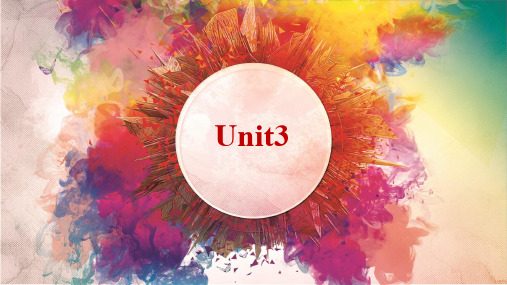
_________ should be __________.
What can be done if someone gets sunstroke?
_________ can be __________.
can be done/ must be done/ should be done
The work can be done﹙do﹚ in an hour.
Wine should not be drunk (not drink) by teenagers.
现在进行时:am / is / are being
过去进行时: was / were being
ride a bike
The bike is being riden by them now.
She said that the bike was being riden by them.
练习
A new cinema is being built now. ________________________________.
情态动词——
aux.v. (must/can/could/may…) + be + v.p.p.
This watch can be repaired in two days.
This watch can not be repaired ….
Can this watch be repaired in two days?
Unit3
被动语态的构成: Baby, down! (被: be done)
be的各个时态?
Unit 6 被动语态-专题写作及阅读精练 人教版九年级英语(附答案)

人教九年级英语Unit 6专题讲练Unit 6 When was it invented?·一般过去时被动语态语法归纳1. 一般过去时的被动语态的构成一般过去时的被动语态表示在过去某一时间发生的被动性动作,由“was/were+及物动词的过去分词+by+动作执行者”构成。
如果无须说明动作的执行者是谁,则可省略“by+动作执行者”。
注意:不及物动词的过去分词只能用于完成时,不能用于被动语态。
It was generally believed by the scientists in thepast that the sun was the center of the universe.过去,科学家们普遍认为,太阳是宇宙的中心。
2.一般过去时的被动语态的基本句式句式构成例句肯定句主语+was/were+及物动词的过去分词+其他。
The road was built in1998. 这条道路于1998年修建。
否定句主语+was/were not(weren’t)+及物动词的过去分词+其他。
The mouse ran toofast and was notcaught by the cat. 老鼠跑得太快,没有被猫逮住。
一般疑问句及答语Was/Were+主语+及物动词的过去分词+其他。
肯定回答:Yes, 主语+was/were.否定回答:No, 主语+wasn’t/weren’t.—Was this articlewritten by Lu Xun?这篇文章是鲁迅写的吗?—Yes, it was. 是的,它是。
/No, itwasn’t. 不,它不是。
特殊疑问句特殊疑问句+was/were+主语+及物动词的过去分词。
Where were the lostchildren found? 这些丢失的孩子们是在哪儿找到的?3. 特殊情况的被动语态1). 含有双宾语的被动语态含有双宾语的主动句变被动句时,可以将其中任何一个宾语变为被动结构的主语。
英语九年级上册Unit6 When was it invented[被动语态]
![英语九年级上册Unit6 When was it invented[被动语态]](https://img.taocdn.com/s3/m/40220a39a9114431b90d6c85ec3a87c240288a03.png)
4. (变为现在进行时态被动语态) Trees are being planted by the farmers.
5. (变为现在完成时态被动语态) Trees have been planted by the farmers.
复合宾语或者双宾语的句子要注意: 一般 情况下把指人的宾语作为被动句的主语. 1.We call Mr. Smith a living Lei Feng.
Mr. Smith__i_s_c_a_ll_e_d_ a living Lei Feng (by us).
2.Tom’s father bought him a book.
by和后面的宾语)一般可以省略
不知道或者没必要说明动作执行者是谁
根据上下文,需要强调动作的承受者 可以带宾语的短语动词和及物动词一样可以 用于被动语态, 但要注意不可丢掉后面的副 词或介词.
The farmers are planting trees. 1. (变为一般现在时态被动语态)
Trees are planted by the farmers. 2. (变为一般过去时态被动语态)
A needn’t be thrown B mustn’t be thrown
C can’t throw
D may not throw
6. The girl _____ singing when we passed by.
A heard B was heard C was heard to D heard to
Some photos ________ by African children.
英语人教版九年级全册unit 6 Grammar Focus
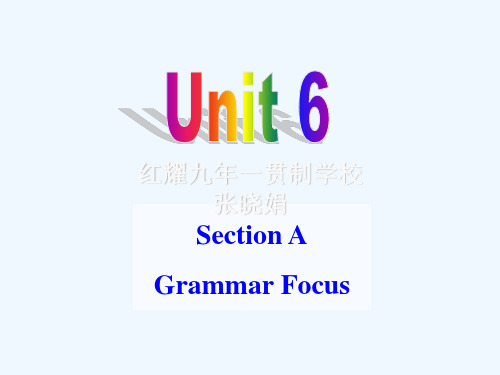
请你给我们表演一个节目。
Read the sentences and pay attention to the underlined parts.
When was the car invented? It was invented in 1885. Who were they invented by? They were invented by Julie Thompson. What are they used for? They are used for seeing in the dark.
your hometown last year? 5. No student is __se_e_n___(see) in the playground.
6. History is __m__a_d_e___ by the people. ( make) 7. He is often __a_s_k_e_d___ to do the work by the
( by us )
主语 谓语动词被动语态的过去分词 介词+ 宾语
主动句变为被动句所遵循的4个步骤:
1. 把原主动句中的宾语变为被动句的主语。 2. 把动词变为被动形式即be+过去分词,
并注意其人称和数随主语的变化,而动 词的时态则保持不变。 3. 原主动句的主语如需要则放在by后面以它 的宾格形式出现(注代词的宾格),如不需 要则可省略。
4. 其它的成分(定语、状语)不变。
过去式被动语态的几种句型
肯定句 主语 + be + 过去分词 + (by…) A sweet song was sung by her on the stage. 2 否定句 主语 + be + not +过去分词 + (by…) A sweet song wasn’t sung by her on the stage. 3 一般疑问句 Be + 主语 +过去分词 + (by…)?
九年级Unit6一般过去时的被动语态人教版

3. 主动句中感官动词see/hear/watch/feel等和使役动词 make/let/have等后跟省略to的动词不定式,变为被动语态 时应加上不定式符号to。 Eg.I saw a heavy man enter the house. A heavy man was seen to enter the house. 4. 系动词、不及物动词或某些短语动词(happen, take
二、主动语态变被动语态应注意的问题 1. 有些短语动词相当于及物动词,变为被动句时介词或副词不 能去掉。 eg.They put off the meeting because of the weather. The meeting was put off because of the weather. 会议因天气的缘故被推迟了。 2. 含有双宾语的主动句变为被动句时,通常把指“人”的间接宾 语变为主语,指“物”的直接宾语保留不变;如果把指物”的直 接宾语变为主语,则在间接宾语前加to或for。 My aunt gave me an e-dictionary yesterday. I was given an e-dictionary yesterday. An e-dictionary was given to me yesterday.
place, come true, fall asleep…)没有被动语态。 Eg.What happened to Mr. Brown? 布朗先生发生了什么事?
将下列句子变为被动语态。
1. He chose six story books the other day. Six were _______ chosen by him the other day. story books _____ 2. Uncle Lee gave Jack a large cake for he painted the wall wonderfully. Jack _____ was _____ given a large cake for he painted the wall wonderfully.
九年级英语全册Unit6单元语法专题SectionAGrammarFocus_4c人教版
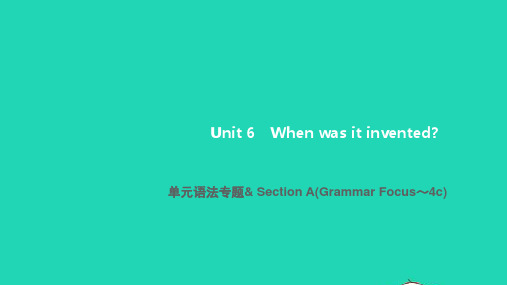
Monday.
A. accepts B. accepted C. was accepted D. is accepted
(C )2. (2018·重庆)—Who's the little girl in the photo, Laura?
—It's me. This photo______when I was five.
Unit 6 When was it invented?
单元语法专题& Section A(Grammar Focus~4c)
语法知识专讲
被动语态(二) 一、一般过去时的被动语态 在第五单元已介绍了被动语态的概念及主动语态变被动语态的用法,本单 元主要介绍一般过去时的被动语态。一般过去时的被动语态的结构: 1. 肯定句:主语+was/were+Vp. p(+by…).
A. is taken B. takes
C. was taken
D. took
C( )3. (2019·百色改编)As we know,printing ______ during the Sui and Tang
Dynasties in China.
A. invented
B. is invented
e. g. :—Was he invited to the party?他被邀请去参加晚会了吗? —Yes, he was. 是的。
4. 特殊疑问句:特殊疑问词(When/Where/Who/…)+was/were+主语+Vp. p(+ by…)?
e. g. :Where was the car parked?那辆车停在什么地方?
by ordinary people by accident.
人教版英语九年级全册Unit6对比一般过去时和一般将来时的被动语态

比照一般过去时和一般将来时的被动语态一、构成比照1. 一般过去时的被动语态:was / were + 动词的过去分词如:The teaching building was built six years ago.这座教学楼建于六年前。
2. 一般将来时的被动语态:“will be + 动词的过去分词〞或“am / is / are going to be + 动词的过去分词〞如:This museum will / is going to be finished next month.这座博物馆将于下个月竣工。
二、否认形式和疑问形式比照1. 否认形式:★一般过去时的被动语态:was / were + not + 动词的过去分词如:The window was not broken by him.窗玻璃不是他打碎的。
★一般将来时的被动语态:“will not be + 动词的过去分词〞或“am / is / are not going to be + 动词的过去分词〞如:The new film will not / isn’t going to be shown in our city next week.那部新电影下周不在我们城市放映。
2. 疑问形式:★一般过去时的被动语态:通常把was / were置于主语前。
如:Were the textbooks written in 2000?这些课本是2000年写的吗?Where were those buses made?那些公共汽车是哪里制造的?★一般将来时的被动语态:将will, (be going to中的) am / is / are置于主语之前。
如:When will the road be opened to traffic?这条路什么时候通车?Are we going to be asked to attend the meeting?我们会被邀请参加会议吗?【趁热打铁】Ⅰ. 请选出能填入空白处的最正确选项。
Unit 6 When was it invented九年级英语全册 人教版 课件(共24张PPT)
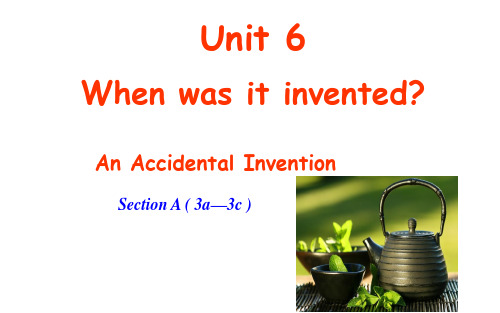
Task 2 Read Para. 2 carefully , then answer the questions below.
1. Who is called “the saint of tea?” Lu Yu. He knows tea very well.
2. What is Cha Jing about?
AEbnogulta5n0d00 years ago
China
around 1660
ChinCahinaKorea Japan
Canada the USA
during the 6th and 7th centuries
Australia
in the 19th century
How tea spread to other countries
He knows the nature of tea very well.
Paragraph3 阅读前(Pre—reading)
5. When was tea brought to other countries?
People believed that tea brought to Korea and Japan during the 6th and 7th centuries. In England, tea didn’t appear until around 1660, but in less than 100 years, it had become the national drink. The tea trade from China to Western countries took place in the 19th century. This helped to spread the popularity of tea and the tea plant to more places around the world. Even though many people now know about tea culture, the Chinese are without doubt the ones who best understand the nature of tea.
人教版九年级英语Unit6主动语态变被动语态句型的方法课件
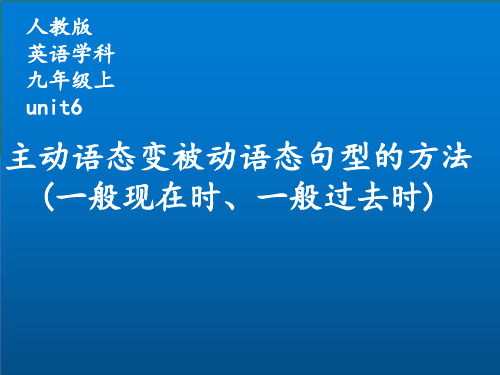
一般过去时的例题解析:
2、Our parents advised us not to go out
satleopn: e. 主语
1
谓语 宾语 把原主动句中的宾语变为被动句的主语。
step2:找出谓语动词,变成结构是 be+done,advise的过去分词:advised
The trees were planted by him two days ago.
2.Judson invented the zipper in 1893. The zipper was inventedby Judson in 1893.
3.People brought tea to Korea. Tea was brought by People to Korea.
总结技巧:
•1.原句宾语变主语
•2.看时态,看人称,灵活使用be by People to Korea.
一般现在时的例题解析: 一般现在时的例题解析: 你会通过讲解的方法,将下列三个主动句变成被动句吗? did; found B.
• 谓语动词变成过去分词 Computers________ by him last week.
allowed D. use C. 一般过去时的例题解析:
•3.原句主语需放在by后变宾格形式 The Great Wall _______ all over theworld.
•4.其它的成分(定语、状语般现在时
am /is / are +动词的过去分词
一般过去时
was / were +动词的过去分词
主动句变为被动句所遵循的4个步骤:
- 1、下载文档前请自行甄别文档内容的完整性,平台不提供额外的编辑、内容补充、找答案等附加服务。
- 2、"仅部分预览"的文档,不可在线预览部分如存在完整性等问题,可反馈申请退款(可完整预览的文档不适用该条件!)。
- 3、如文档侵犯您的权益,请联系客服反馈,我们会尽快为您处理(人工客服工作时间:9:00-18:30)。
教学内容:被动语态
教学目标:
知识目标:明白被动语态的用法,学会使用被动语态。
能力目标:会运用语法结构排除一定的干扰,提高解题能力。
教学重点:学习被动语态的构成以及用法。
教学难点:被动语态的用法。
教学方法:参与式教学法。
教学用具: PPT课件。
教学过程Before class:(先学任务)
1)判断下列句子是主动语态还是被动语态。
•Many people speak Chinese .
•English is studied by us .
•We clean our classroom .
•The leaves are picked by hand .
•I use the telephone .
During class: Step1: warming up & lead in
1.Check students’ assignment and introduce what they will
learn in this class.
2.语态的种类和基本概念
主语是动作的执行者就用主动语态Many people speak Chinese
主语是动作的承受者就用被动语态The leaves are picked by hand Step2: 被动语态的构成
Step3:主动语态变为被动语态
主动语态变为被动语态的方法:
1 . 主动句中的宾语变成被动句的主语.
2 . 主动句中的谓语动词变成被动句的be + 过去分词.
3 . 主动句中的主语变成被动句by 的宾语, 放在谓语动
词后面. 如果不强调动作执行者时, by 短语可省略.
Many people speak English .
English is spoken by many people . 当堂训练
Change the following sentences into the Passive voice
1. They play basketball in their school .
2. I washed my clothes yesterday .
3. We clean our classroom
4. I use the telephone
5. bHe bought a new bike last week
Homework
How to change the following sentence into the Passive voice
He will sing a song tomorrow。
